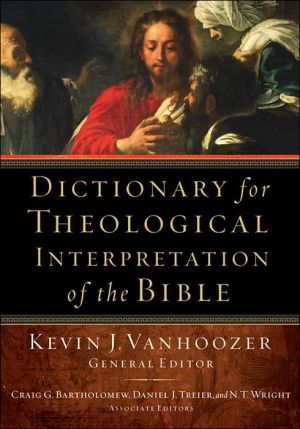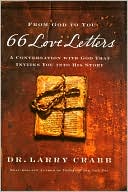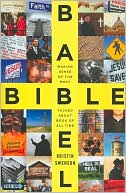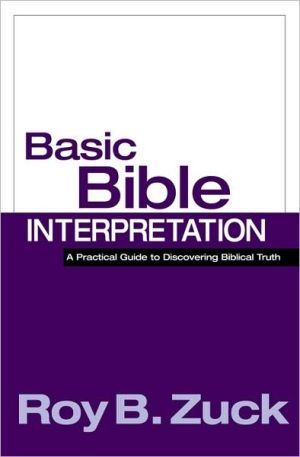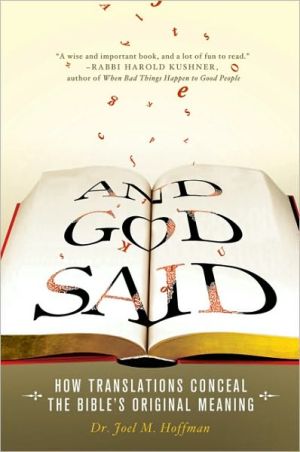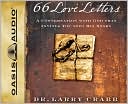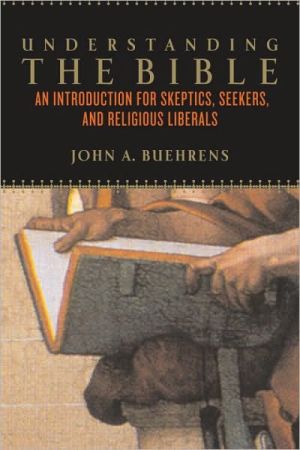Dictionary for Theological Interpretation of the Bible
For the pastor or serious layperson, the realm of biblical interpretation can be a confusing maze of personalities, communities, methods, and theories. This maze can often result in obscuring the main goal of interpreting Scripture: hearing and knowing God better. \ The Dictionary for Theological Interpretation of the Bible is a groundbreaking reference tool that introduces readers to key names, theories, and concepts in the field of biblical interpretation. It discusses these approaches and...
Search in google:
For the pastor or serious layperson, the realm of biblical interpretation can be a confusing maze of personalities, communities, methods, and theories. This maze can often result in obscuring the main goal of interpreting Scripture: hearing and knowing God better. The Dictionary for Theological Interpretation of the Bible is a groundbreaking reference tool that introduces readers to key names, theories, and concepts in the field of biblical interpretation. It discusses these approaches and evaluates their helpfulness in enabling Christians to hear what God is saying to the church through Scripture. The contributors come from a variety of backgrounds, and the dictionary covers a broad range of topics with both clarity and depth. Library Journal Single-volume reference works are always ambitious undertakings, and this dictionary by evangelical publisher Baker is more ambitious than most. Along with Craig G. Bartholomew (philosophy, Redeemer University Coll.), Daniel J. Treier (theology, Wheaton Coll.), and N.T. Wright (bishop of Durham, UK), general editor Vanhoozer (systematic theology, Trinity Evangelical Divinity Sch.; Is There a Meaning in This Text?) has compiled an impressive roster of contributors who represent a wide range of conservative (but not narrowly so) British and North American scholars. Their approaches range from dismissive to critically appreciative. In nearly 300 articles they offer an up-to-date treatment of the theology of each book of the Bible as well as of general topics (e.g., "Dead Sea Scrolls," "Source Criticism"); issues affecting biblical interpretation (e.g., "Authority of Scripture," "Hermeneutics"); and key doctrines and themes (e.g., "Trinity," "Incarnation"). Bottom Line Topic-wise, there is much overlap with InterVarsity Press's New Dictionary of Biblical Theology: Exploring the Unity and Diversity of Scripture (eds., T. Desmond Alexander and Brian S. Rosner, 2001). However, this work offers a much wider range of articles on contemporary approaches to biblical interpretation and postmodern philosophical trends. There are some gaps in coverage, especially in the "Interpreters and Interpretive Communities" category: users will be hard-pressed to gain a balanced understanding of the source theory of the Pentateuch or of the structure of the hypothetical gospel source "Q," despite the theological importance of these issues. Nonetheless, this deserves to be a first-stop reference for evangelical scholars seeking to engage contemporary biblical scholarship.-Steve Young, McHenry Cty. Coll., Crystal Lake, IL Copyright 2005 Reed Business Information.
\ Library JournalSingle-volume reference works are always ambitious undertakings, and this dictionary by evangelical publisher Baker is more ambitious than most. Along with Craig G. Bartholomew (philosophy, Redeemer University Coll.), Daniel J. Treier (theology, Wheaton Coll.), and N.T. Wright (bishop of Durham, UK), general editor Vanhoozer (systematic theology, Trinity Evangelical Divinity Sch.; Is There a Meaning in This Text?) has compiled an impressive roster of contributors who represent a wide range of conservative (but not narrowly so) British and North American scholars. Their approaches range from dismissive to critically appreciative. In nearly 300 articles they offer an up-to-date treatment of the theology of each book of the Bible as well as of general topics (e.g., "Dead Sea Scrolls," "Source Criticism"); issues affecting biblical interpretation (e.g., "Authority of Scripture," "Hermeneutics"); and key doctrines and themes (e.g., "Trinity," "Incarnation"). Bottom Line Topic-wise, there is much overlap with InterVarsity Press's New Dictionary of Biblical Theology: Exploring the Unity and Diversity of Scripture (eds., T. Desmond Alexander and Brian S. Rosner, 2001). However, this work offers a much wider range of articles on contemporary approaches to biblical interpretation and postmodern philosophical trends. There are some gaps in coverage, especially in the "Interpreters and Interpretive Communities" category: users will be hard-pressed to gain a balanced understanding of the source theory of the Pentateuch or of the structure of the hypothetical gospel source "Q," despite the theological importance of these issues. Nonetheless, this deserves to be a first-stop reference for evangelical scholars seeking to engage contemporary biblical scholarship.-Steve Young, McHenry Cty. Coll., Crystal Lake, IL Copyright 2005 Reed Business Information.\ \
